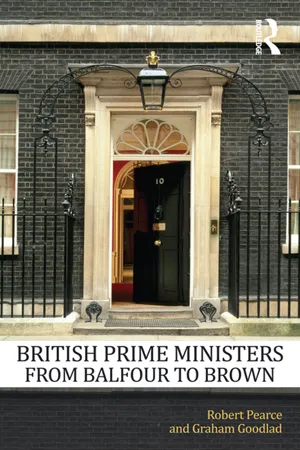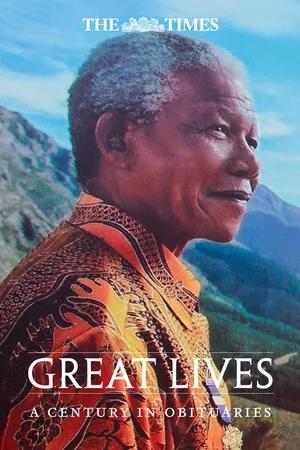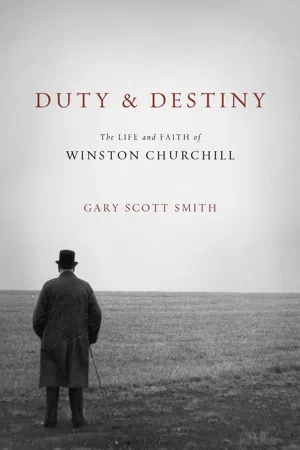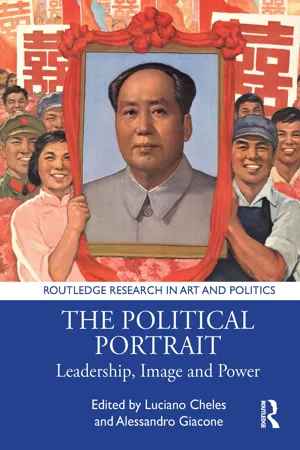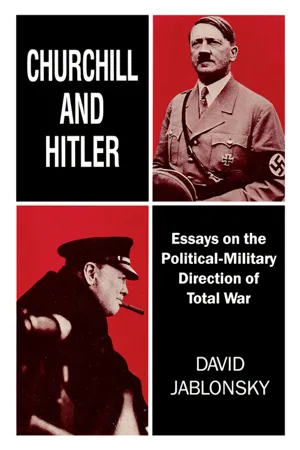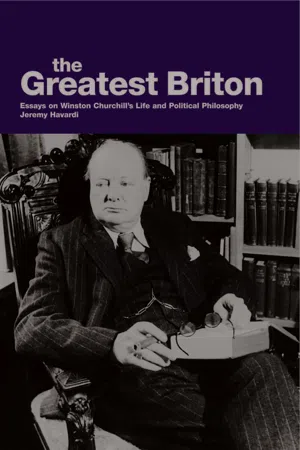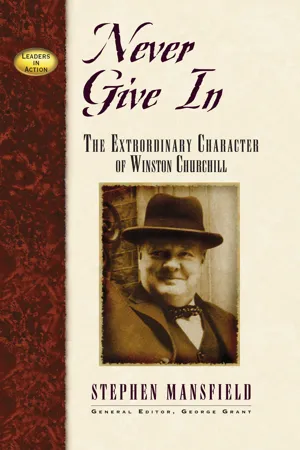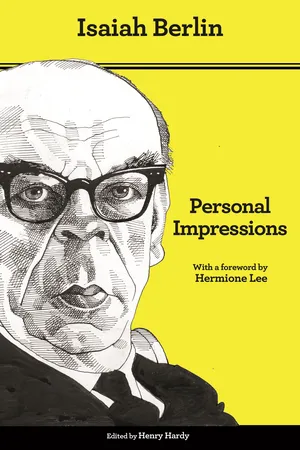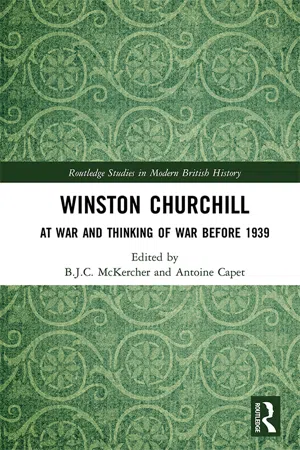History
Winston Churchill
Winston Churchill was a prominent British statesman who served as Prime Minister during World War II, leading the country to victory against Nazi Germany. Known for his powerful oratory and unwavering determination, Churchill's leadership and resilience inspired the British people and earned him a revered place in history. His contributions to the Allied war effort and his role in shaping post-war Europe remain influential to this day.
Written by Perlego with AI-assistance
Related key terms
Related key terms
1 of 4
Related key terms
1 of 3
9 Key excerpts on "Winston Churchill"
- eBook - ePub
- Robert Pearce, Graham Goodlad(Authors)
- 2013(Publication Date)
- Routledge(Publisher)
9 Winston Churchill (1874–1965) Prime Minister: May 1940–July 1945, October 1951–April 1955‘I have seen him take a lot of punishment, and not once did he look like a loser. Not once did he give me the feeling that he was in any way worried or anxious as to the outcome of the fight. Gradually I have come to think of him as invincible.’Diary of Churchill’s doctor, Lord Moran, 20 August 1943.1In 2002 Winston Churchill was voted the ‘greatest Briton’ in a BBC poll. He is certainly the most celebrated: more books have been written about him than about any other person in British history. He is highly regarded for many aspects of his career, including his ‘wit and wisdom’: surely everyone knows at least one of his, often politically incorrect, jokes. But it is for his wartime leadership, from 1940 to 1945, that he is especially remembered. A.J.P. Taylor, an iconoclastic left-wing historian who delighted in mocking the political establishment in general and pretentious premiers in particular, nevertheless described Churchill – albeit hidden away in a footnote – as ‘the saviour of his country’.2 Yet in fact there is no consensus view. Churchill is a highly controversial figure. The spectrum of verdicts stretches, at the one end, from the glowing, almost filial endorsement of the official multi-volume biographer Martin Gilbert, to, at the other, the intense, unremitting criticisms voiced by Clive Ponting and John Charmley, the latter significantly entitling his 700-page study Churchill: The End of Glory.The rise to the premiershipWinston Churchill felt enormous exhilaration on becoming Prime Minister on 10 May 1940. At last he had the authority he craved. ‘I felt as if I were talking with destiny, and that all my past life had been but a preparation for this hour and for this trial.’3 - eBook - ePub
- (Author)
- 2015(Publication Date)
- Times Books(Publisher)
Sir Winston Churchill
The greatest Englishman of his time. World leader in war and peace. 24 January 1965Sir Winston Churchill, whose death in London yesterday is reported on the centre page, led Great Britain from the peril of subjugation by the Nazi tyranny to victory; and during the last four years of his active political life he directed his country’s efforts to maintain peace with honour, to resist another tyranny, and to avert a war more terrible than the last. In character, intellect, and talent he had the attributes of greatness.An indifferent schoolboy, he was indifferent at nothing else which he attempted. Inheriting Lord Randolph Churchill’s energy and political fearlessness, and being granted twice as many years, he carried to fulfilment a genius that in his father showed only brilliant promise. Leader of men and multitudes, strategist, statesman of high authority in the councils of nations, orator with a command of language that matched the grandeur of his themes, able parliamentary tactician, master of historical narrative, his renown is assured so long as the story of these lands is told.The great war leader of his age, he lived through the fastest transformation of warfare the world has ever known, charging with the 21st Lancers at Omdurman in his youth, and in his old age arming his country with the hydrogen bomb.He first entered Parliament in the sixty-fourth year of the reign of Queen Victoria. Sixty-four years later, in the thirteenth year of the reign of her great-great-granddaughter, he retired from it. Through more than half a century of British history there was not a year – barely a month – in which he was not actively and prominently engaged in public affairs.Churchill’s outstanding political virtue, which never deserted him, was his courage. There was the sheer physical courage which led him to seek more risks on active service before he was 25 than many professional soldiers know in a lifetime; and which gave him the will, when he was past 75, to overcome an affliction which would have laid other men low from the start. But there was moral and intellectual courage in equal degree. He served in Kitchener’s Army in the Sudan – but attacked Kitchener publicly for his desecration of the Mahdi’s tomb. He was returned as a Conservative in the ‘Khaki Election’ of 1900 – only to devote a passage in his maiden speech to a generous tribute to the Boers. No sooner was his maiden speech over than he shocked the Conservative front bench again by turning on one of his own party leaders, the Secretary of State for War, with a scorn which would have been startling even in a member of the Opposition. - eBook - ePub
Duty and Destiny
The Life and Faith of Winston Churchill
- Gary Scott Smith(Author)
- 2021(Publication Date)
- Eerdmans(Publisher)
7STATESMAN AND WARTIME PRIME MINISTER
1940–1945
I f Winston Churchill had died in 1940, Peter Stansky contends, “he would have been remembered chiefly as a fascinating but ultimately unsuccessful political figure.”1 The advent of World War II dramatically changed Churchill’s reputation. He rose from the ashes of political powerlessness to serve as Britain’s indispensable leader from May 10, 1940, until July 27, 1945. As noted, during the 1930s, he stated several times that his political career was essentially over. In the 1930s, David Cannadine observes, Churchill “was widely distrusted as a man of unstable temperament, unsound judgement, and rhetorical (and also alcohol) excess.” Moreover, around him hung “an unsavoury air of disreputability and unseemliness, as a particularly wayward, rootless and anachronistic product of a decaying and discredited aristocratic order.” He was widely viewed as a shameless cadger and “incorrigible scrounger.”2 As Britain confronted the Nazi peril in 1940, many saw Churchill as “a dangerous adventurer.” At best, he was a “delightful rogue who lacked political judgment,” and at worst, he was “unscrupulous, unreliable, and unattractively ambitious.”3 Desperate times called for taking chances, however, and in the darkest days of World War II, the British turned to Churchill to save them.Upon becoming prime minister, Churchill declared, “I felt as if I were walking with destiny, and that all my past life had been but a preparation for this hour and this trial.”4 In the early 1920s, English journalist and poet Harold Begbie had described Churchill as “a Saul on the way to Damascus” who needed the direction of a great ideal to make him “Paul on his way to immortality.”5 Defending Western civilization against Nazism supplied that ideal. His leadership of Britain during World War II, especially his ability to inspire its citizens to resist the Nazi onslaught, earned Churchill countless accolades and cemented his celebrated place in history. Churchill viewed “the British cause as the cause of freedom and national independence all over the world.” He staunchly believed that victory over the Nazis was possible and “imposed this faith on the less confident.”6 - eBook - ePub
The Political Portrait
Leadership, Image and Power
- Luciano Cheles, Alessandro Giacone(Authors)
- 2020(Publication Date)
- Routledge(Publisher)
3 Representing Leaders in Britain The Portraits of Winston Churchill, Harold Wilson, Margaret Thatcher and Tony Blair Simon DownsChurchill – The British Bulldog
Winston Churchill (1874–1965) was Prime Minister from 1940 to 1945 and again from 1951 to 1955. However, before commenting on the portraits that were realized during these years, and later, it is worth drawing attention to an early image: a painting that was commissioned from William Orpen, an official war artist, by the newspaper magnate Lord Rothermere (Figure 3.1 ). It was realized in 1916, shortly after the disastrous military campaign at Gallipoli, which Churchill had spearheaded as First Lord of the Admiralty, to force Ottoman Turkey (Germany’s ally) out of the war, and was shown at the Royal Academy Summer Exhibition, in London, the following year. Churchill is represented with a furrowed brow, a stooped posture and unkempt hair. He wears a coat and clutches a hat, as if he were about to leave the room – a probable allusion to his resignation from Herbert Asquith’s wartime cabinet.1 Churchill treated the painting as something of a public exposure of his personal guilt2 and hung it in Downing Street during the Second World War. It appears in the background of contemporary photographs as a public reminder of his greatest military failure.Without giving up politics, Churchill spent the interwar years as a media personality, speaking on the radio and mixing with stars in Hollywood. He published in popular magazines (he had a passion for science and wrote with H. G. Wells), and featured on the cover of the January 1936 issue of The Strand Magazine . He even appeared with Charlie Chaplin in 1929 on the set of City Lights . The image told a very un-British story of a working-class man (Chaplin) and an upper-class man (Churchill) standing as equals: but this was only on a Hollywood sound stage.As a wartime prime minister, Churchill became a symbol of defiance and resistance. The Ministry of Information, MOI, plastered Britain with propaganda posters featuring his effigy. A poster of 1940 bearing the slogan “Let Us Go Forward Together” depicted him smiling confidently with tanks and fighting airplanes in the background. Another, issued the following year, represented him stern-eyed pointing his finger at the observer – a posture that echoed Alfred Leete’s “Your Country Needs You” propaganda image of 1914 – while the slogan declared “[You] Deserve Victory!” - eBook - ePub
Churchill and Hitler
Essays on the Political-Military Direction of Total War
- David Jablonsky(Author)
- 2014(Publication Date)
- Routledge(Publisher)
4 Churchill: The Victorian Man of ActionThe most common public image of Winston Churchill is the wartime picture taken by the famed photographer, Yousuf Karsh. The British leader glowers out from that photograph, truculent and combative. Never mind that the menacing look was reportedly caused by Karsh’s insistence that Churchill remove his ever-present cigar from his mouth. What remains is that quintessential aura of resistance and defiance against all odds that came to symbolize the spirit of the nation Churchill led throughout the Second World War. Paradoxically, this image of a modern warlord in the greatest of all twentieth century conflicts owes its existence to the late Victorian era into which Churchill was born in 1874. For it was during those years in the Indian summer of Queen Victoria’s reign that the future British Prime Minister developed his singular traits of character and formed his concepts of war and personal leadership that were to endure throughout his long life.Foremost among the Victorian influences on the young Churchill was a pervasive sense of historical continuity that stretched beyond the Victorian years. To begin with, there was Blenheim Palace with its obelisks of victory, its grand vistas that created a sense of drama, and the great achievements ubiquitously carved in stone, woven in tapestries and painted on canvas. A monument, in short, to one man, John Churchill, first Duke of Marlborough, whose exploits fed into the unique Whig legend devised by the British in the intervening centuries to underpin their imperial ambitions. It was in that great mansion that Churchill was born, and it was among the patrician descendants of the great Whig aristocracy from Stuart and Georgian England that he spent his formative years. It was thus no accident that he never deviated throughout his life from what the British historian J.H. Plumb has described as “that curious ideology of the Whigs, half truth, half fiction; half noble, half base.”1 - eBook - ePub
The Greatest Briton
Essays On Winston Churchill's Life And Political Philosophy
- Jeremy Havardi(Author)
- 2012(Publication Date)
- Shepherd Walwyn Publishers(Publisher)
CHAPTER EIGHTChurchill as War Leader
What were Churchill’s greatest qualities as a war leader?
CHURCHILL’S IMMENSE reputation rests on the leadership he displayed throughout the Second World War. In particular, he is remembered for heroic feats of statesmanship from May 1940 until June 1941, when Britain and the Empire stood alone against the seemingly unstoppable might of Nazi Germany. During this time, and in the absence of military victories, he galvanised the nation with stirring oratory that seemed to breathe new life into the war effort. He showed a vital energy, a sense of unflinching resolve and a ruthless desire to win the war at all costs. But these qualities were not manufactured by the exigencies of conflict: they came from unrivalled political experience and an inner conviction in the rightness of Britain’s cause.What follows is a short analysis of those Churchillian qualities that were vital in the successful leadership of the war.Ceaseless energy
In the 1920s Churchill had written that war leadership required ‘a frenzied energy at the summit’ and an ‘effort to compel events’.1 From the moment he became Prime Minister, Churchill lived up to this standard, providing a dramatic increase in the tempo of government. His private secretary, John Colville, noted early in the war how impressed he was with ‘Winston’s ceaseless industry’. He wrote: ‘He is always having ideas which he puts down on paper in the form of questions and dispatches to Ismay or the C.I.G.S. for examination.’2Churchill’s constant prodding of his officials and generals was reflected in his famous minutes, known as ‘Prayers’ because they invariably started ‘Pray enquire’, and his ‘Action This Day’ tags. Some of these minutes concerned minor issues: one sought to determine the number of apes left on the Rock of Gibraltar; another expressed concern about the protection of animals at London Zoo during the Blitz. Churchill took a meticulous interest in every conceivable aspect of the war. According to Colville, he would scrutinise ‘every document that has anything to do with the war and does not disdain to enquire into the most trivial point’.3 - eBook - ePub
Never Give In
The Extraordinary Character of Winston Churchill
- Stephen Mansfield, George E. Grant(Authors)
- 1997(Publication Date)
- Cumberland House Publishing(Publisher)
He had, his intimates knew, an “inner relationship” with the Bible, and so they were not surprised by his emotional response when the Chief Rabbi of Palestine presented him with a Scroll of the Law atop Mount Scopus in Jerusalem. Before the thousands of Jews who had assembled, Churchill was undone. With tears streaming down his face and the Torah clutched tightly in his hands, he promised, “This sacred book which contains truth accepted by Jews and Christians alike is very dear to me, and your gift will remain in my family as an imperishable souvenir.” 34 Politicians routinely use Scripture to cynically play upon their nation’s Christian memory. Churchill’s use of Scripture was different. He genuinely believed in the inspiration and truth of the Bible, and he knew its power to order his private world. That he could be such a momentous leader was due in part to the fact that he in turn was led by a truth beyond himself: the truth of holy Scripture. D ESTINY “There has to be a purpose to it all. I believe that I was chosen for a purpose far beyond our simple reasoning.” 35 In earlier, more Christian eras, men believed they were moved by a force that today, in our world of evolution and random chance, is taken for arrogance and license. It was the power of predestination, of God’s choosing and ordaining every life for a purpose. Found first in Scripture, it was expanded by Augustine, revived by the Reformers, and has since inspired generations to bold faith and action. Untold numbers have been moved to attempt what on their own strength, without the guarantee of a fixed destiny, they would never have begun. Winston Churchill lived the first twenty-seven years of his life in the Victorian era, an age still rooted in the Christian understanding of the world. The idea of destiny, of a purpose ordained before the beginning of history, figured decisively in men’s thoughts and actions - eBook - ePub
Personal Impressions
Updated Edition
- Isaiah Berlin, Henry Hardy(Authors)
- 2014(Publication Date)
- Princeton University Press(Publisher)
1 and when the crisis finally bursts he is ready, because after a lifetime of effort he has reached his goal.The position of the Prime Minister is unique: ‘If he trips he must be sustained. If he makes mistakes they must be covered. If he sleeps he must not be wantonly disturbed. If he is no good he must be poleaxed’,2 and this because he is at that moment the guardian of ‘the life of Britain, her message, and her glory’.3 He trusted Roosevelt utterly, ‘convinced that he would give up life itself, to say nothing of public office, for the cause of world freedom now in such awful peril’.4 His prose records the tension which rises and swells to the culminating moment, the Battle of Britain – ‘a time when it was equally good to live or die’.5 This bright, heroic vision of the mortal danger and the will to conquer, born in the hour when defeat seemed not merely possible but probable, is the product of a burning historical imagination, feeding upon the data not of the outer but of the inner eye: the picture has a shape and simplicity which future historians will find it hard to reproduce when they seek to assess and interpret the facts soberly in the grey light of common day.VIThe Prime Minister was able to impose his imagination and his will upon his countrymen, and enjoy a Periclean reign, precisely because he appeared to them larger and nobler than life and lifted them to an abnormal height in a moment of crisis. It was a climate in which men do not usually like – nor ought they to like – living; it demands a violent tension which, if it lasts, destroys all sense of normal perspective, overdramatises personal relationships, and falsifies normal values to an intolerable extent. But, in the event, it did turn a large number of inhabitants of the British Isles out of their normal selves and, by dramatising their lives and making them seem to themselves and to each other clad in the fabulous garments appropriate to a great historic moment, transformed cowards into brave men, and so fulfilled the purpose of shining armour. - eBook - ePub
Winston Churchill
At War and Thinking of War before 1939
- B.J.C. McKercher, Antoine Capet(Authors)
- 2019(Publication Date)
- Routledge(Publisher)
6 The limitations of the politician-historian Winston Churchill, rearmament, appeasement, and the origins of the Second World War B.J.C. McKercherMy mind was obsessed by the impression of the terrific Germany I had seen and felt in action during the years of 1914 to 1918 suddenly becoming again possessed of all her martial power, while the Allies, who had so narrowly survived, gaped idle and bewildered.Churchill, 19481Although Winston Churchill famously said, “History will be kind to me, for I intend to write it”, his account of the origins of the Second World War, The Gathering Storm , is woefully inadequate as an historical analysis in understanding how war came and demonstrates the limitations of a politician-historian. Adumbrating on the anti-appeasement polemic, Guilty Men , first articulated in summer 1940,2 Churchill’s analysis lacked any objectivity in determining the complexities of Britain’s foreign and defence policies in the late 1930s. Writing his war memoirs a decade later, he sought to underscore his willingness to confront Soviet policies in the early Cold War – he was leader of the Opposition in the House of Commons and looked to become prime minister again. Thus, he wrote The Gathering Storm partly to promote his apparent astuteness about and prescription to meet the threat that totalitarian aggressiveness posed to Britain and the Western Powers – before 1939, embodied primarily by Adolf Hitler and National Socialist Germany. However, until early 1938, Churchill remained ambivalent about Hitler. Nevertheless, because Britain’s National Government strategy of appeasement failed, he used it in The Gathering Storm
Index pages curate the most relevant extracts from our library of academic textbooks. They’ve been created using an in-house natural language model (NLM), each adding context and meaning to key research topics.
Explore more topic indexes
Explore more topic indexes
1 of 6
Explore more topic indexes
1 of 4
